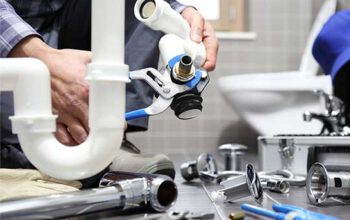When you need to hire an emergency plumber, it is important to choose a reputable professional like Plumbers Linden NJ. This will ensure that your plumbing issues are resolved correctly and quickly, preventing further damage to your home.

Common plumbing emergencies include burst pipes, clogged drains, water heater failure, and sewer backups. Read on to learn more about these problems and how to find an emergency plumber.
Every winter, homeowners across the country wake up to discover that a pipe in their home has burst. This can be incredibly disruptive, not to mention dangerous. When a water pipe freezes and then unfreezes, it creates pressure that can crack or break the pipes and cause significant water damage to your home and property. Water and other debris can flood into rooms, causing furniture, pictures, floors, and appliances to become water-logged and destroyed. This can also lead to costly repair and replacement costs.
Frozen pipes are often caused by very cold temperatures and a lack of insulation. In fact, pipes that run through a crawl space, attic, or exterior walls are particularly susceptible to freezing because these areas of the home are rarely heated. This is why it is important to insulate all of your pipes as well as make sure that the heating system is working properly.
If you suspect that a pipe is frozen, shut off the water at the main line and call an emergency plumber right away. In the meantime, you can try to thaw the pipe by slowly raising the temperature in your house. This will prevent the ice from expanding too quickly, which can increase the pressure in your pipes and cause them to burst. You can also open up any faucets connected to the frozen pipe and leave them running on a trickle (this will raise your water bills significantly but is better than having a burst pipe).
Another way to help prevent frozen pipes is by opening cabinet doors in areas where the pipes are located. This will allow warm air to circulate more easily and may help keep the pipes from freezing in the first place.
If you do have a frozen pipe, it is important to find out which pipe and where it is located before calling an emergency plumber. If it is easy to access, you can attempt to thaw the pipe yourself by using a heating pad, hair dryer, or space heater. It is important to never use a torch or open flame to thaw a pipe, as this can cause it to burst. During the thawing process, it is also important to keep the faucet open so that water and steam can escape.
Clogged Drains
Clogged drains are among the most common plumbing problems, and they’re a sure sign that it’s time to call an emergency plumber. Unless they’re treated immediately, drain clogs can cause a host of issues including wastewater backup, pipe damage and even severe property damage.
The good news is that there are several things you can do to help prevent clogged drains and sewer backups. By disposing of waste properly, using drain covers and regularly maintaining your water heater, you can help keep your drains clear and avoid costly repairs.
Throughout your home, there are drain lines that carry waste away from sinks, tubs and toilets. These lines lead directly to your sewer line, and if this becomes clogged, the drains all over your home will stop working. In some cases, a sewer clog can even lead to sewage backups into your home.
There are many things that can cause a clogged drain, and the best way to identify one is by noticing if it takes longer for water to drain than usual. You may also notice signs of a clog like gurgling sounds in your toilet or a foul smell coming from the drain.
Most drain clogs form over time as grease, hair and soap scum build up in the pipes, and they eventually choke off the flow of water. Preventing drain clogs begins with educating yourself and your family on what can and cannot go down the drains. By teaching kids and family members to put food scraps in the garbage or use a strainer over the sink, you can cut down on the amount of waste that goes down your drains.
Other common causes of clogged drains include mineral build-up, “flushable” wipes and tampons, and tree roots. These can all be prevented by ensuring that you’re not flushing anything other than toilet paper and human waste, regularly cleaning your drains with a plunger or snake, and installing proper falls on your drainage system. By taking these measures, you can help prevent drain clogs and other serious plumbing problems in your home.
Water Heater Failure
Your hot water heater is an essential part of your daily routine. It allows you to take hot showers, wash dishes and clean clothes. So, when it begins to malfunction, you need an emergency plumber right away. A quick response from a skilled emergency plumber will prevent further damage and make your home safe again.
A common problem with water heaters is that they don’t produce enough hot water. This is often caused by a faulty thermostat or heating element. Luckily, this is an easy fix. To solve the issue, you’ll need to turn off the power to the water heater in your service panel. After that, you can reset the thermostat or replace the heating element.
Another cause of poor water production is a build-up of sediment in your tank. This is especially common in older units, but can happen to any type of water heater. If your water is cloudy or has a metallic taste, this is a sign that there is sediment in your water heater. You should flush the sediment out as soon as possible to avoid damage and to improve your water’s taste and smell.
If you are noticing signs of a failing water heater, it’s important to call an emergency plumber immediately. Not only will this help you get the hot water you need, but it will also protect your home from serious damages such as extensive water leaks.
When choosing an emergency plumber, be sure to consider their availability and location. Ideally, you want to find a plumber who is available 24 hours a day, seven days a week. This will ensure that you can get the help you need when you need it, no matter what time of the day or night it is.
While it is not always possible to predict when a plumbing emergency will occur, there are some signs that you should look out for. These include:
Sewer Backups
A sewer backup is a nightmare scenario for any homeowner. It can cause significant water and sewage damage to your home, as well as pose serious health risks for you and your family. Fortunately, there are several ways to help prevent sewer backups, including regularly scheduled inspections and keeping items like grease, hair, paper towels, and toys out of your drains.
Sewer lines are designed to carry only wastewater and toilet paper; anything else that goes down your drains can cause a clog or blockage. The main sewer line typically runs through the lowest part of your house, such as the basement or garage, and is where all of your waste travels to your septic tank or the public city connection. If the main sewer line becomes clogged, it can result in a backup that can affect your entire home.
Clogs can be caused by items that are flushed down the toilet (like the toy your toddler decided to flush), by cooking grease or other solid materials that wastewater pipes were not created to handle, and by broken lines. Older homes often have cast iron, concrete, or clay sewer lines, and these types of piping can break down over time.
Heavy rains can also contribute to a sewer backup. When a neighborhood receives lots of rain, the sewer system may reach its capacity and overflow, sending sewage into residential pipes.
If you experience a sewer backup, shut off your home’s water valve and turn off any appliances in the affected area. Open windows and doors to ventilate the area. Wear protective clothing, such as a face mask, eye protection, gloves and rubber boots. Remove all contaminated materials from the affected areas and dispose of them properly.
If your property suffers damage from a sewage backup, you will need to contact your insurance company. Most homeowners insurance policies offer optional sewage backup coverage that covers the cost of cleaning, replacing or restoring damaged items. Periodic inspections and routine maintenance can help extend the life of your sewer line, reducing the risk of a blockage or clog that could lead to sewage backups.

